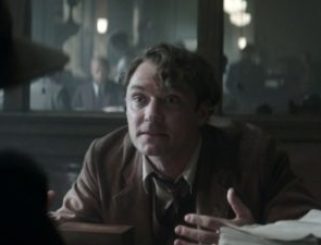
Simon Helberg, Meryl Streep, & Hugh Grant in Florence Foster Jenkins
Based on the true story of socialite, arts patron, and would-be coloratura soprano Florence Foster Jenkins, this Stephen Frears movie (trailer, with a nice feature afterward) is a perfect summer entertainment. Even though practically everyone other than her doting, doddering age-peers recognizes how truly awful her singing is and how bizarre are her costumes, the movie nevertheless is persistently upbeat and goodhearted.
Florence is generous and kind and, while it’s clear she’ll never be the singer she thinks she is, in Meryl Streep’s wonderful characterization, you don’t hold her delusions against her. Streep is supported by Hugh Grant, in a wholly sympathetic portrayal of Florence’s unfailingly supportive husband, St. Clair Bayfield, a handsome actor seven years younger than Florence in real life.
I fell in love with her pianist, Cosmé McMoon, as played by Simon Helberg. McMoon starts his new gig as her accompanist with great enthusiasm and the promise of a much fatter wallet, and when he hears her sing, his growing shock and bewilderment is priceless.
The only mean-spirited skunk in the whole film is New York Post gossip columnist Earl Wilson. His headline after Florence’s 1944 Carnegie Hall appearance called her the world’s worst singer. Nice opening credits, great classic cars, love her beads!
As The Guardian’s Peter Bradshaw says, “there are no wrong notes in this film,” and the audience loved her “so-bad-it’s-good” performances, and you will too!
Rotten Tomatoes critics rating 86%; audiences 77%.



 This New Zealand comic gem (
This New Zealand comic gem (
 Director Michael Grandage’s movie Genius (
Director Michael Grandage’s movie Genius ( Even if you’re familiar with the broad outlines of Srinivasa Ramanujan’s amazing history, this movie (
Even if you’re familiar with the broad outlines of Srinivasa Ramanujan’s amazing history, this movie (
 In this brilliantly funny movie (
In this brilliantly funny movie (
